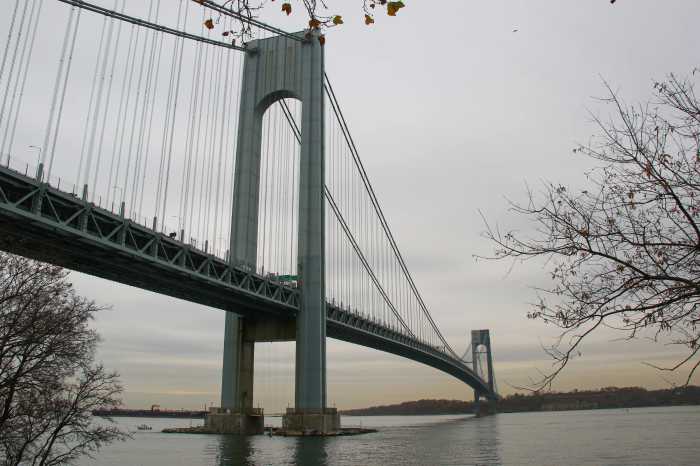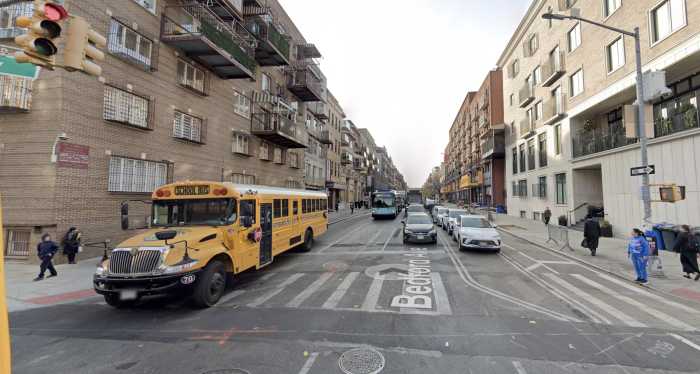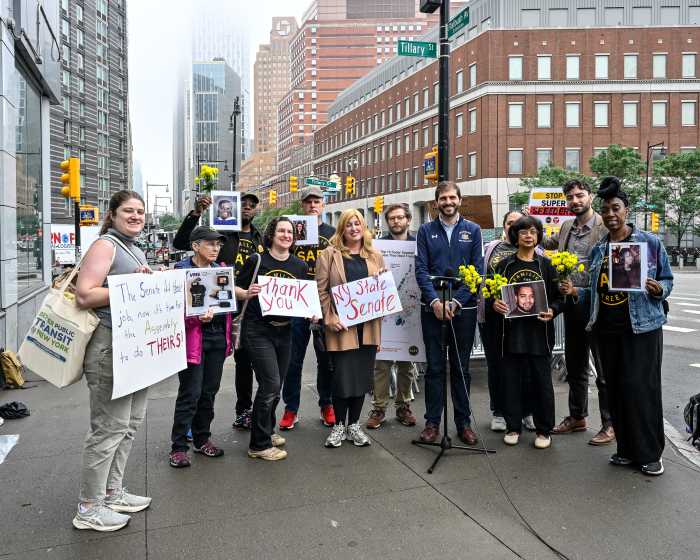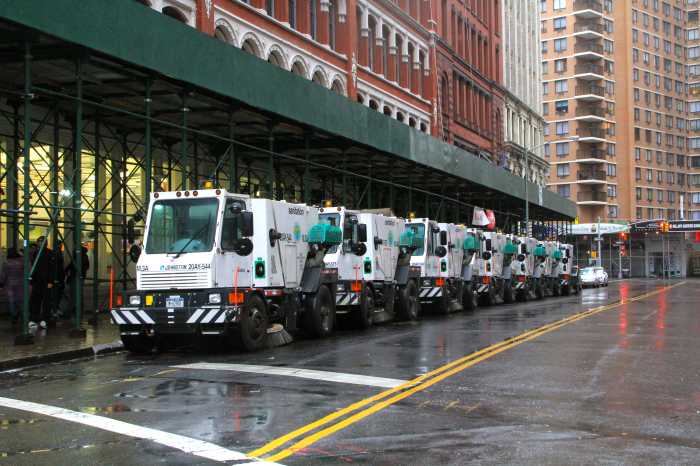The city has, for the fourth time, changed its mind on the McGuinness Boulevard redesign.
This fall, the Department of Transportation will implement the road diet it has already finalized, then rejected, on the southern half of the roadway. Between Calyer Street and Meeker Avenue, the department will remove one vehicle traffic lane in favor of full-time parking-protected bike lanes.
The plan isn’t new — it was approved for the whole of McGuinness Boulevard last summer after years of community engagement and planning by DOT. But, weeks after the final redesign was chosen, Mayor Eric Adams ordered DOT to come up with something else — reportedly at the urging of powerful local businesses and one of his top advisors, Ingrid Lewis-Martin.
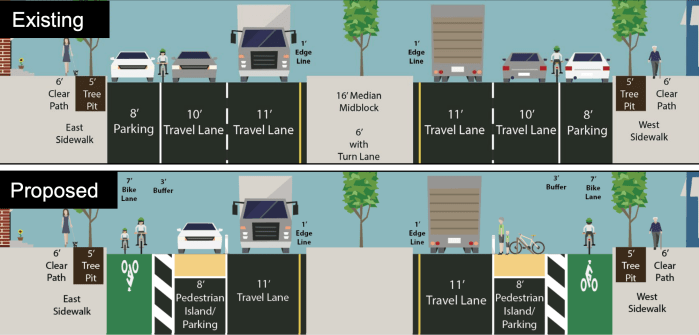
By the end of the summer, the city had put finalized a stripped-back plan for the northern half of McGuinness Boulevard, between the Pulaski Bridge and Calyer Street, but still planned to implement the full road diet on the southern half. Then, this August, that changed abruptly when DOT announced it would continue the pared-back plan on the full length of McGuinness Boulevard.
The decision drew outrage from community members and local elected officials, who argued the city had gone back on its word despite the demands of the community.
The Oct. 2 announcement that the city would return to its first plan and remove a lane of vehicle traffic came just as suddenly.
“This administration is committed to making our streets safer for all New Yorkers, no matter how they travel around our city — by car, by bike, or on foot,” said Deputy Mayor for Operations Meera Joshi, in a statement. “I am grateful to DOT for its commitment to McGuinness Boulevard and willingness to adapt to community and elected officials’ feedback, and of course to New Yorkers for their candor.”
Joshi had previously spoken in favor of the stripped-back plan, saying at an August press conference that there was “lots to be happy about” on McGuinness Boulevard.
A DOT spox said the decision was made “in response to community feedback on our previous proposal and continued outreach over the last several weeks.”
Kevin LaCherra, an organizer with the group Make McGuinness Safe, said the criticism from locals “must have gotten through” to City Hall.
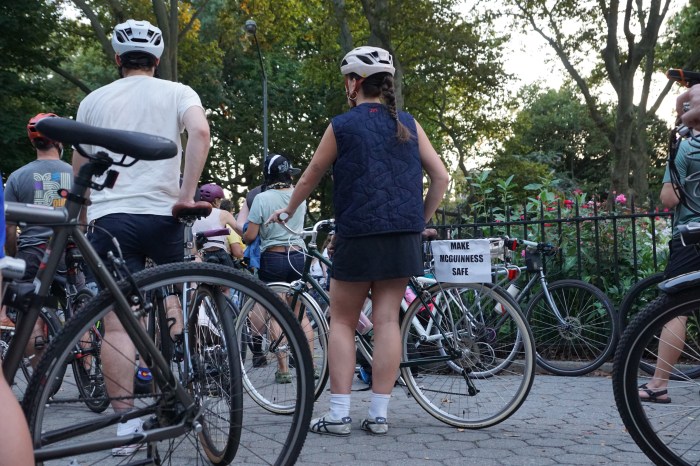
“We have taken every opportunity to say, ‘If you do this, it’s going to be a disaster,'” he said. “And why would any administration want that? I’m sure the Adams administration didn’t want that. So they made the right choice. This is the way our government is supposed to work.”
The redesign is backed by DOT’s own statistics, LaCherra added, which analyzed crashes, injuries, and the way locals and businesses regularly use the road as the department worked to finalize a decision.
It was not immediately clear Wednesday when the redesign would be completed, but crews are set to start work in the coming weeks, per DOT. While construction is underway, and after it’s completed, DOT will monitor the project and make adjustments if needed.
The northern half of McGuinness Boulevard, between the Pulaski Bridge and Calyer Street, will remain as-is, with two vehicle traffic lanes in each direction and a barrier-protected bicycle lane on both sides.
In a joint statement, a collection of local politicians including Council Member Lincoln Restler, Borough President Antonio Reynoso, and Assembly Member Emily Gallagher celebrated the announcement.
“Credit to the Adams administration and Department of Transportation for taking the safety of Greenpoint seriously,” the pols said. “We are excited to see safety improvements implemented on McGuinness Boulevard this month and are immensely grateful to the Make McGuinness Safe community coalition for their relentless advocacy. We will work together with DOT to monitor and adjust to ensure this is a success for Greenpoint.”
The decision came in the middle of a tumultuous time for the Adams administration. Hours before the news broke, Adams arrived in federal court for his first appearance before a judge for a wide-ranging corruption case, in which he is charged with bribery, fraud, and accepting foreign donations. While he was still in the courtroom, prosecutors said they may end up charging Adams with additional crimes — and that charges against other people involved in the case are likely.
Last week, federal investigators raided the home of Lewis-Martin — the Adams advisor who had reportedly spoken against the McGuinness redesign.
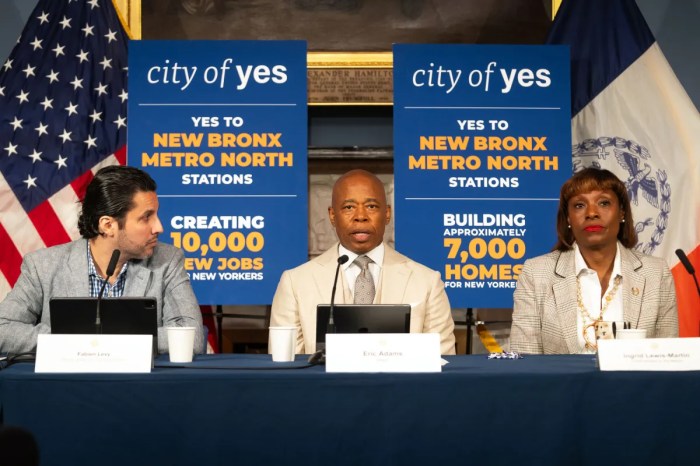
Restler said local elected officials have been talking with the Adams administration about the redesign since the announcement in August, but that he hasn’t been a “key negotiator.” He credited the local community and advocates for making their voices heard throughout the entire process.
Asked whether the tumult at City Hall may have played a role in the administration’s decision to move forward with a full redesign, Restler said he “[doesn’t] know.”
“I don’t think this was a decision that they came to in a day, or post-indictment,” he said. “I’ve given up on trying to understand what the internal decision-making process is over there. But I’m pleased that they came to the right conclusion, and whatever the reason or rationale, this is a decision that enhances safety in our community, and that’s what matters.”
LaCherra was optimistic about the redesign, and felt positive about Wednesday’s announcement — despite the city’s flip-flops.
“I’ll feel a hell of a lot better when I’m walking to the subway across one lane of traffic in each direction. That’s when I’ll feel good,” he said. “But I can’t imagine who in their right mind would want to put us through anything else. I just have to hope. The mayor made a promise to this community. Through the action that he’s taking today, he’s keeping that promise. The same thing for DOT.”



